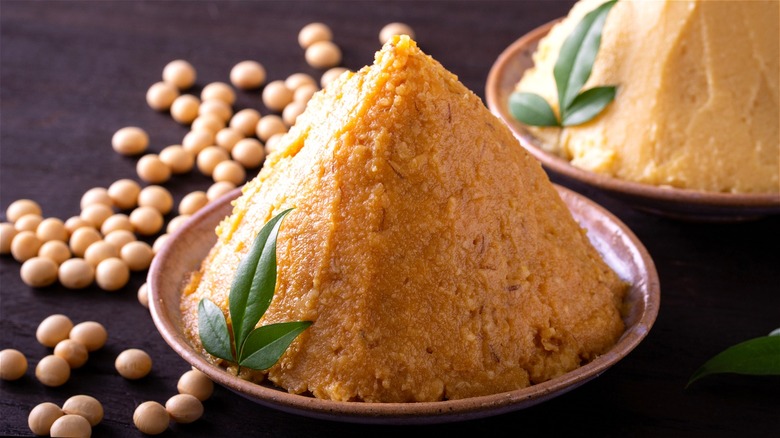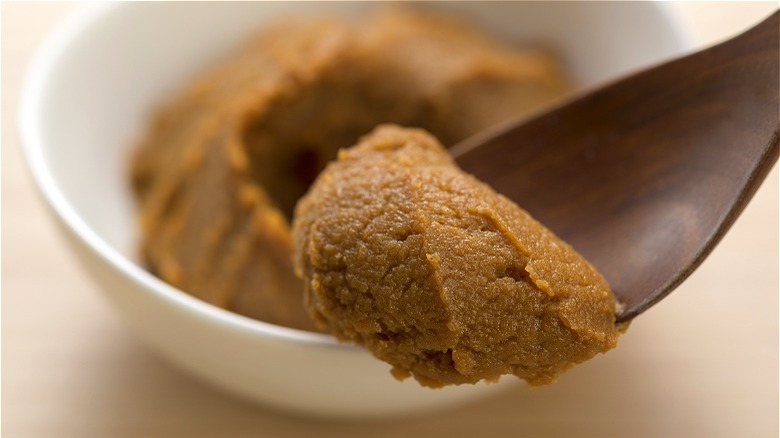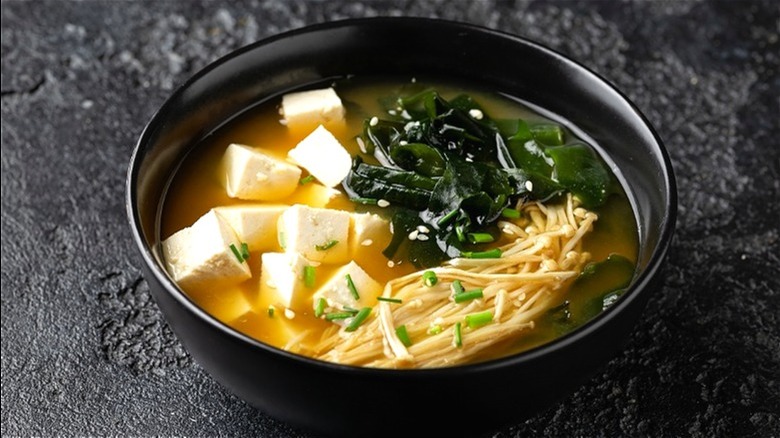Is Miso Paste Considered Vegan? What You Need To Know
Trying to change your eating habits can be downright confusing, especially if you're making the jump to a vegan diet. A vegetarian diet excludes all forms of animal protein, including fish, but a vegan diet can range in definition depending on how strong your convictions are. Veganism is typically defined as an abstention from all animal-based products including food, clothing, and lifestyle products. If you're trying to stick to vegan-friendly foods, however, the process can still be quite complicated when you consider the manufacturing processes behind some of the nation's most-used food products.
Surprisingly, everyday items such as conventional sugar can contain animal bones. Even your favorite chocolate-covered nuts, with that signature shellac coating, are produced with the remnants of Indian lac insects. If you want assurance that a food item is vegan, you can always look for listed allergens or the "certified vegan" logo on packaged products. But sometimes, you might wrongly assume a specific food is vegan when it's actually not. Take Sriracha, for example. While most popular brands don't contain any animal products, some companies add fish sauce for extra flavor.
If you're looking to cultivate the perfect marinade for a kimchi-inspired beyond burger, you may want to use miso paste to level up the overall flavor. Miso paste is vegan-friendly — but you might still want to read the label.
Miso paste is a fermented food with a long-winded history
As you gear up to prepare an ancient grains bowl for your next lunch, you may want to try a miso-inspired vinaigrette to go along with all of that hearty goodness. If you're sticking to a vegan diet, however, you should learn the basics surrounding this fermented food so you can decide whether or not to incorporate it into your next meal. Miso paste has roots steeped in ancient Chinese culture. The first miso paste, known as Jiang, was derived from animals. Not until the 7th century BC did soybean miso become the most popular variety for many additional cultures and countries, especially Japan.
Today's miso paste is defined as a thick, umami-rich paste made of soybeans that have been fermented with salt and koji, which is the mold responsible for the fermentation process. Depending on where you buy miso, you'll often come across three different varieties: red, white, and yellow, with the red standing apart as the most concentrated in flavor. No matter which variety you buy, you'll be happy to know that all standard miso paste products are typically vegan-friendly.
The only thing you'll want to take into consideration is if the miso you purchase was made in a facility that also processes items such as meat, eggs, or dairy. When it comes to chowing down, you're still not entirely in the clear, though. The meal miso paste is most known for isn't typically suited for vegan diners.
Vegans may want to avoid miso soup
Among the essential Japanese dishes to know, miso soup is one that can be enjoyed in a variety of ways and is typically comprised of miso paste, stock, and an assortment of protein and vegetables. Making homemade miso soup may be frustrating for vegans wishing to follow an authentic recipe, as dashi stock is most commonly used as a base for the dish. While dashi stock is generally comprised of seaweed and shiitake mushrooms, most varieties also include bonito flakes, which are dried, shaved pieces of tuna, and small dried fish or niboshi.
However, there is a way to make dashi stock at home without the fish. The New York Times Cooking's mushroom miso soup features a vegan-friendly dashi made using shiitake mushrooms and kombu or seaweed as the base. To get that rich umami flavor, a variety of rice wines are used coupled with a light soy sauce.
If you're not excited by the idea of using mushrooms and want to skip miso soup, you can still spruce up you favorite recipes with this umami-rich paste. Try using miso paste in a salad dressing, pesto, or as a unique addition in brownies to create a salty, sweet treat. The only time adjustments need to be made is with traditional miso soup. All in all, miso paste proves to be a creative product used to spruce up many traditional vegan and non-vegan recipes.


